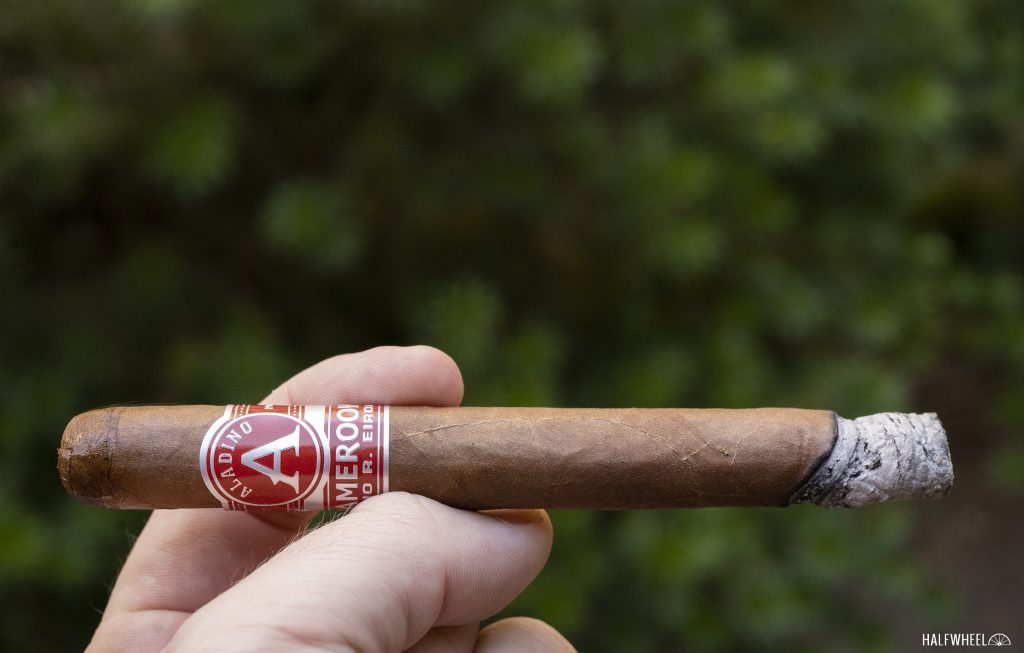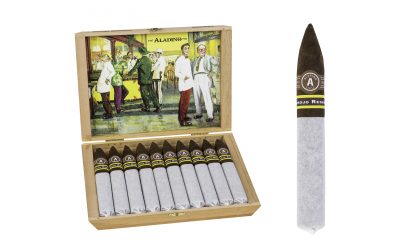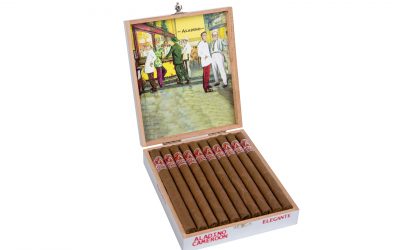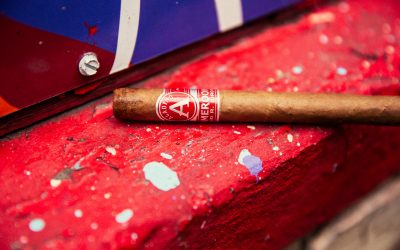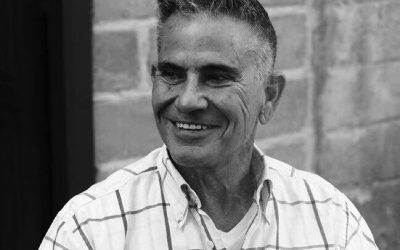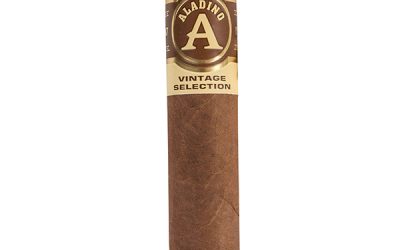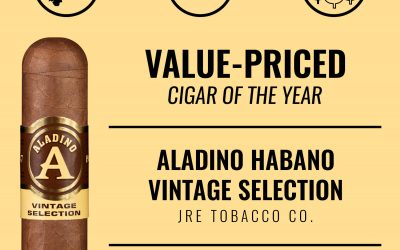ALADINO CAMEROON LONSDALE
When it comes to the story behind a cigar, much of the time it comes from the head of the company, but in the case of the Aladino Cameroon line, it comes from a cigar broker by the name of Tom Poehler.
Poehler, who represents JRE Cigar Co. in Texas and the surrounding states, says the new line dates back to a cigar called the Camacho Select that was debuted in 2006. Julio Eiroa had created the cigar when he and his family still owned the Camacho brand to be a different offering from the corojo-dominant cigars for which the brand was known. Specifically, it used Cameroon tobacco grown in Africa by the Meerapfel family.
While the line received a fair amount of acclaim, it simply didn’t seem to capture the attention of smokers like the fuller-bodied corojo options in the line.
Of course, Eiroa sold the Camacho brand to Davidoff in 2008, members of the family would briefly join Davidoff and then start their own companies with Julio launching his own company, JRE Tobacco Co., in 2016 along with his son, Justo.
Over those years, Poehler said that Julio Eiroa never lost his love for Cameroon tobacco, but like any good farmer, found himself wanting to grow his own version, convinced not only that he could so in Honduras but that he could do it better than the version that came from Africa.
To embark on that process, he acquired the necessary seeds via an international leaf broker and got to work. Yet they couldn’t seem to get the desired result.
About 3 1/2 years ago, Poehler visited Julio and Justo in Honduras and the conversation about Cameroon tobacco came up. When touring the factory and fields, Poehler noted that there was about a quarter to half of an acre being grown at the time simply for seeds.
The following year, Poehler returned to Honduras and in particular, Julio’s office. He inquired about those Cameroon plants, and was told by Julio that it was simply “no bueño.” The leaves from that crop weren’t as veiny or splotchy as the African-grown version, a reason that would later be discovered because he was too hands-on with it compared to the techniques used to grow it in Africa. Essentially, he was treating it the way he treats all his other tobaccos, and as such, it was showing the results of its care.
Undeterred, Poehler asked if they could take that tobacco and try it, specifically by replacing the wrapper on some aged Rancho Luna cigars to create a quick test blend. The result was positive, and next thing you know, Julio is making a few phone calls and the company is making plans to grow more Cameroon-seed tobacco.
That put the plans for what would eventually become the Aladino Cameroon into high gear. After some initial blends were found to be too close in flavor to existing Cameroon-wrapped cigars on the market, the company arrived at a blend of corojo-seed Honduran tobacco grown by the Eiroas that would best showcase their Honduran-grown Cameroon wrapper.
The line is offered in three sizes,
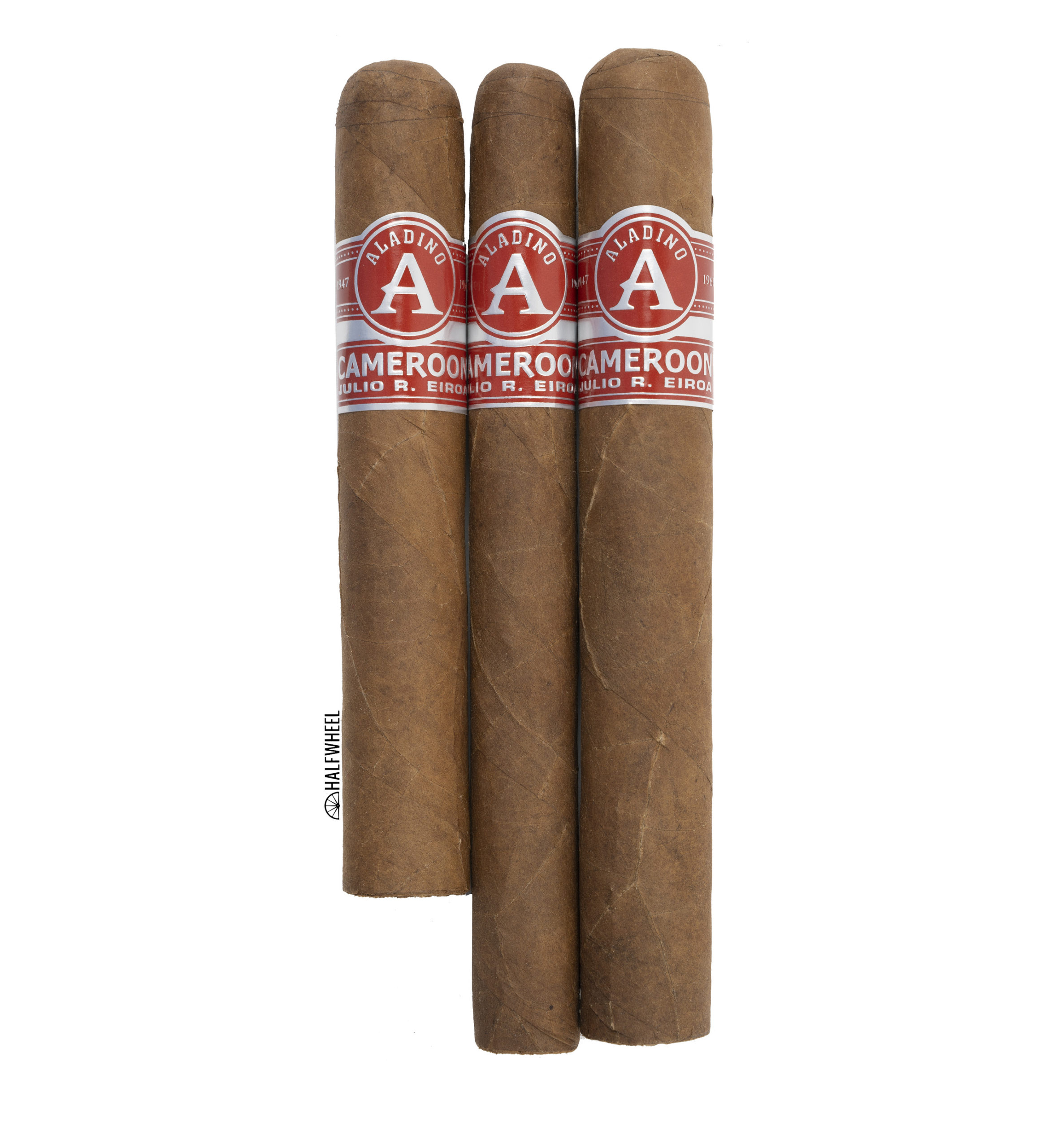
- Aladino Cameroon Robusto (5 x 50) — $8.80 (Box of 24, $211.20)
- Aladino Cameroon Lonsdale (6 x 43) — $7.80 (Box of 24, $187.20)
- Aladino Cameroon Super Toro (6 x 52) — $9.80 (Box of 24, $235.20)
The new line received a soft launch in the second half of May 2020, with a wider shipment going out the following month.
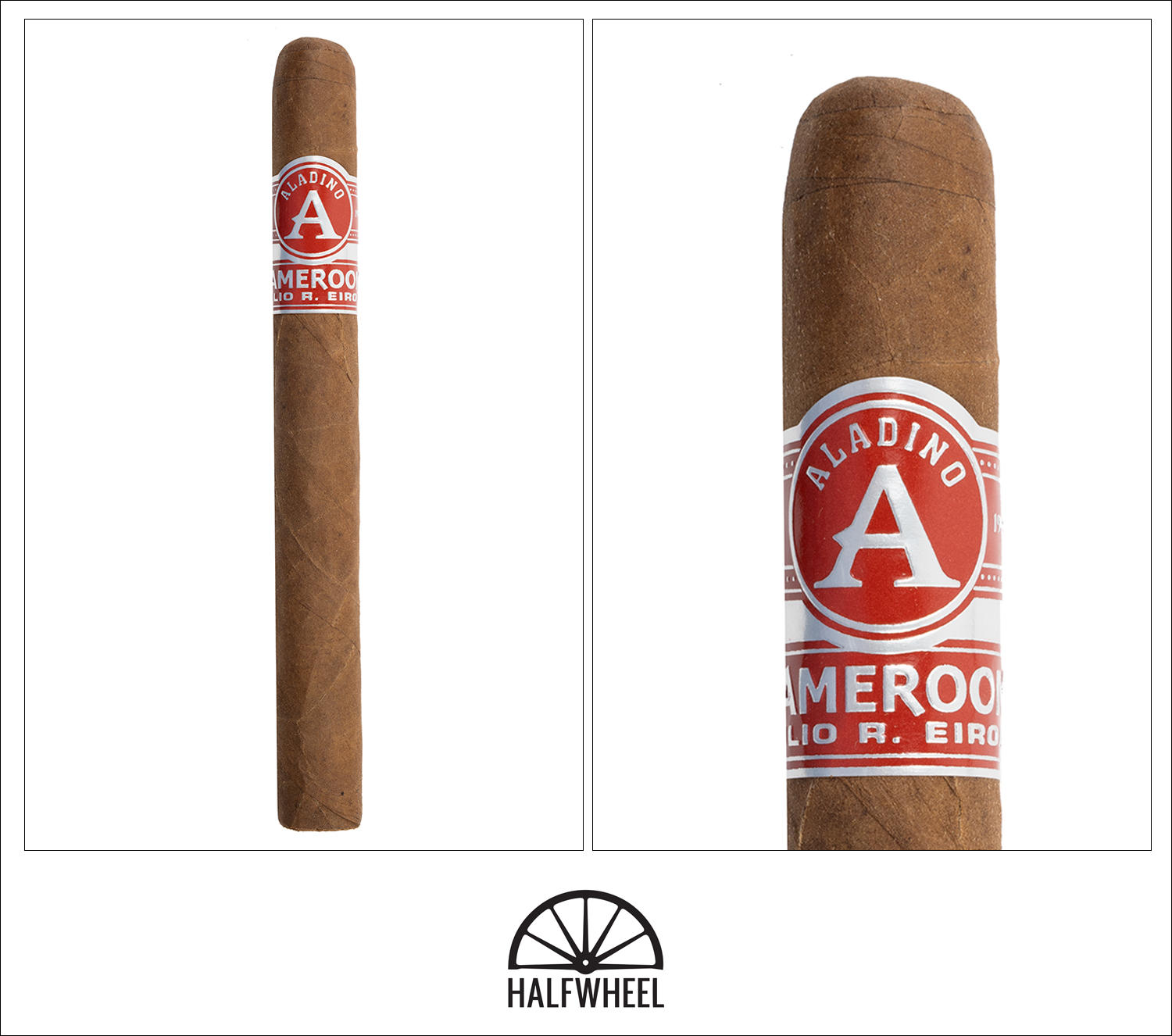
- Cigar Reviewed: Aladino Cameroon Lonsdale
- Country of Origin: Honduras
- Factory: Fabrica de Puros Aladino at Las Lomas Jamastran
- Wrapper: Honduras (Cameroon)
- Binder: Honduras (Corojo)
- Filler: Honduras (Corojo)
- Length: 6 Inches
- Ring Gauge: 43
- Vitola: Lonsdale
- MSRP: $7.80 (Box of 24, $187.20)
- Release Date: May 2020
- Number of Cigars Released: Regular Production
- Number of Cigars Smoked For Review: 3
The Aladino Cameroon Lonsdale doesn’t quite look like what I think of when I think of a Cameroon-wrapped cigar, something that as noted above is attributed to the way it is grown. Sure, it’s a Honduran-grown Cameroon, though that might not be immediately apparent to whoever is smoking it. The wrapper has a bit of redness to it, but it feels much more like a Honduran corojo. The seams are the most visible thing about the cigar, while some small veins stand out as well, though neither are problematic or distracting. There’s a bit more give than I was expecting; the cigar isn’t soft but certainly isn’t as firm as many other cigars I have smoked lately. As with any Cameroon-seed leaf, I’m also not inclined to squeeze it excessively. The foot varies from sample to sample; the first is fairly neutral at first whiff, offering mild aromas of earthiness and something that reminds me of an empty tobacco barn. The second is cooler, spicier and sweeter, and ultimately more enjoyable, while the third tops that performance with a bit of creaminess being added. Follow-ups reveal a bit more spice and pepper, eventually leading to some particular spice that can be sharp in the nostrils. Airflow is just a bit firm on the cold draw, while flavors are very muted if really present at all; the first two samples are just mildly sweet with something that falls between sweet and sour sauce and a General Tso’s glaze. The third adds a bit of graham cracker but backs off on any spice or pepper.
The first puffs of the Aladino Cameroon Lonsdale reveal a much more vibrant profile than what the pre-light experiences offered. There’s fairly sharp pepper, a thick red apple sweetness, the early goings of a red chili pepper spice, and a bit of dry earth that stands out on retrohales. One sample gives me just the slightest bit of what I think is saltiness, something I don’t generally equate with Honduran tobacco, and which has me rechecking my palate. The earthiness moves down to the palate and the back of the throat, offering a mouth-drying sensation that is accented by black pepper, which leads me to invoke one of my favorite descriptors: terroir, specifically Honduran terroir. The cigar burns incredibly quick, the burn line almost sprinting out of the gate and getting to nearly one inch in under 10 minutes, and the first clump of ash falling about 15 minutes into the cigar. Once it does, white pepper steps up to take control over the next few puffs. Flavor is medium-full, body is medium, and strength medium, at least for the moment. Construction is very good, with a quick moving burn line the most noticeable aspect.
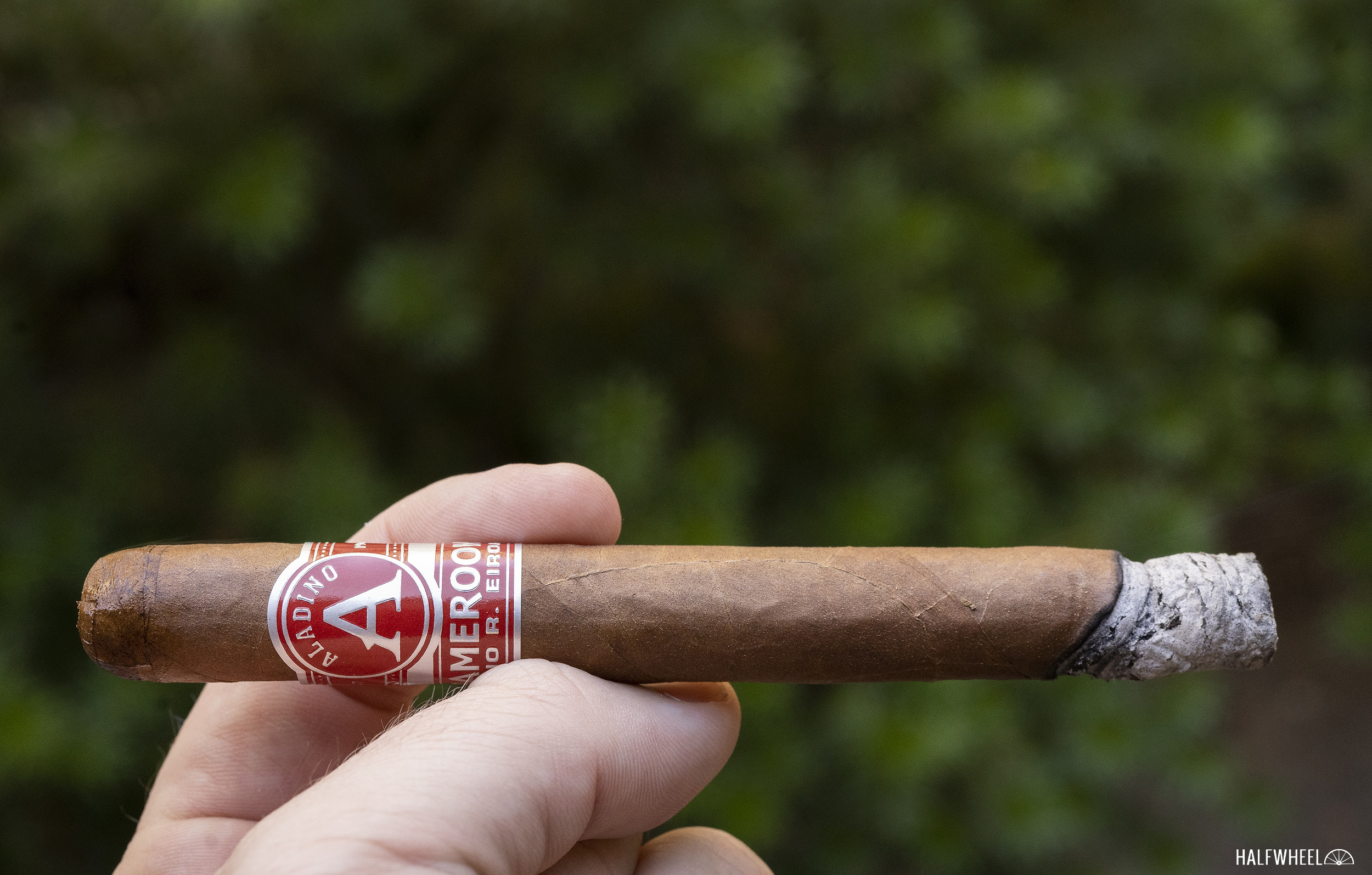
While I’m getting plenty of terroir, the things that I have yet to experience much of are the hallmarks of modern Cameroon tobacco, notably that sweet and spicy interplay that is found in African-grown versions. For whatever reason, they don’t stand out here quite as much, and I’m left to wonder whether it’s due to the vitola or the blend, though the slender size would seem to suggest it should be standing out. If nothing less, what is there really competes with the Honduran terroir, which by the midpoint is a bit lighter in terms of body but quite vibrant in terms of white pepper and a bit of chalk. Retrohales are definitely vibrant and borderline spicy, starting with a pinch of chili pepper being added to a more familiar pepper offering and then building to an almost even mix. There seems to be a bit more strength from the Aladino Cameroon Lonsdale at the end of the second third, while the flavor is still medium-full and body is medium. The technical performance remains good, with one of the faster combustion rates I can recall. Flavor is medium-full, body is medium-plus, and strength is closer to medium.
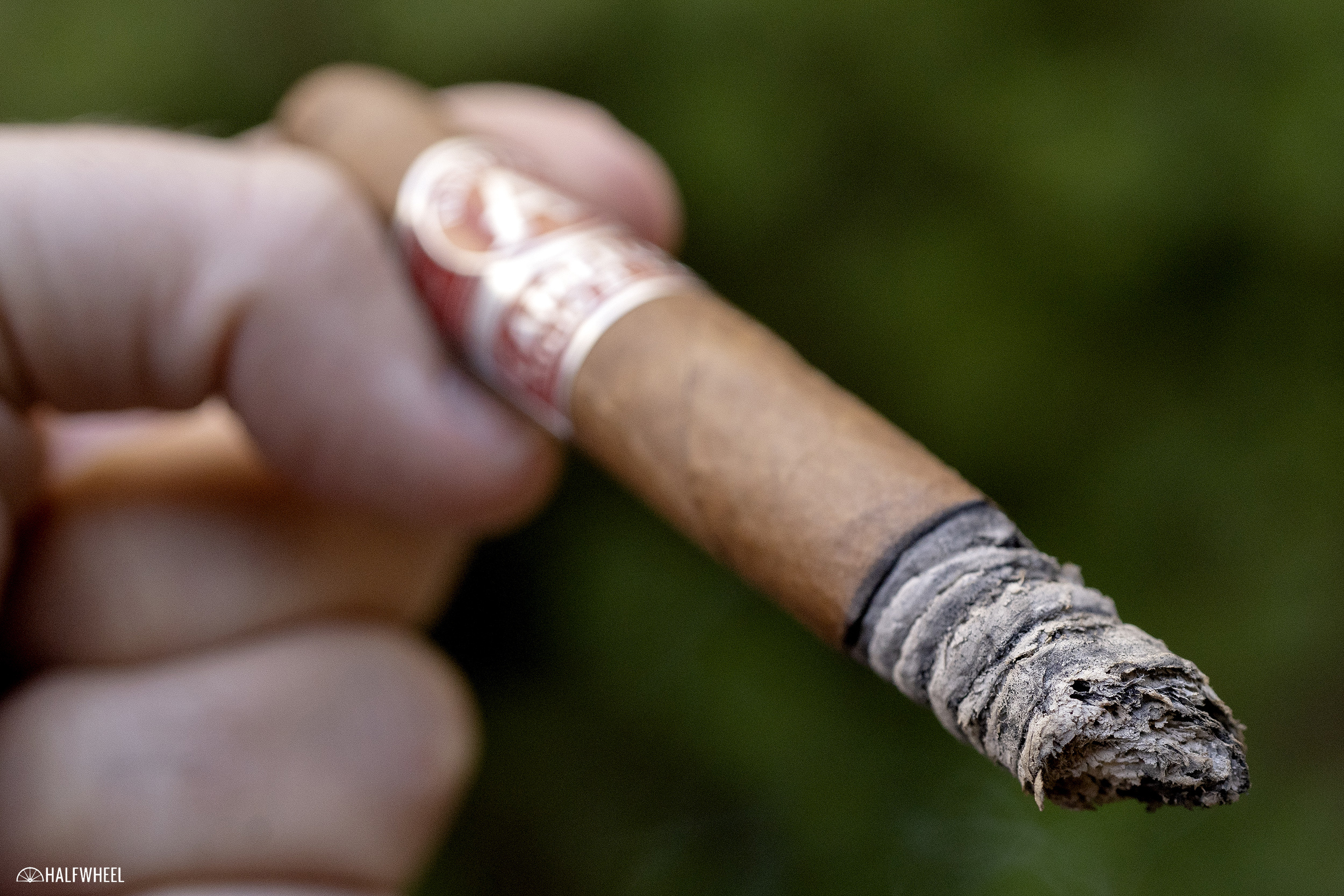
As the final third gets underway, I’m getting more of the spicy aspect that I would expect from a Cameroon-seed wrapper, and it is becoming more forward with the red chili pepper flavor. It definitely contributes a vibrant flavor, though in its singularity it doesn’t offer the complexity of other Cameroon tobaccos. What isn’t here is the corresponding sweetness, which would be welcomed, even though its absence isn’t seemingly hampering my enjoyment As the burn line continues to race up the body of the cigar and hits where the band would be, the smoke takes on one of its fullest levels of flavor and body, not necessarily evolving in flavor but just turning the volume up on what it has been offering for the majority of the its second half. The final puffs add a bit of chalk and dry peppermint before the cigar comes to a close, still burning beautifully and able to be smoked down to a tiny nub. One cigar has a bit of funky bite at the tail end that merits a quick drink of water.
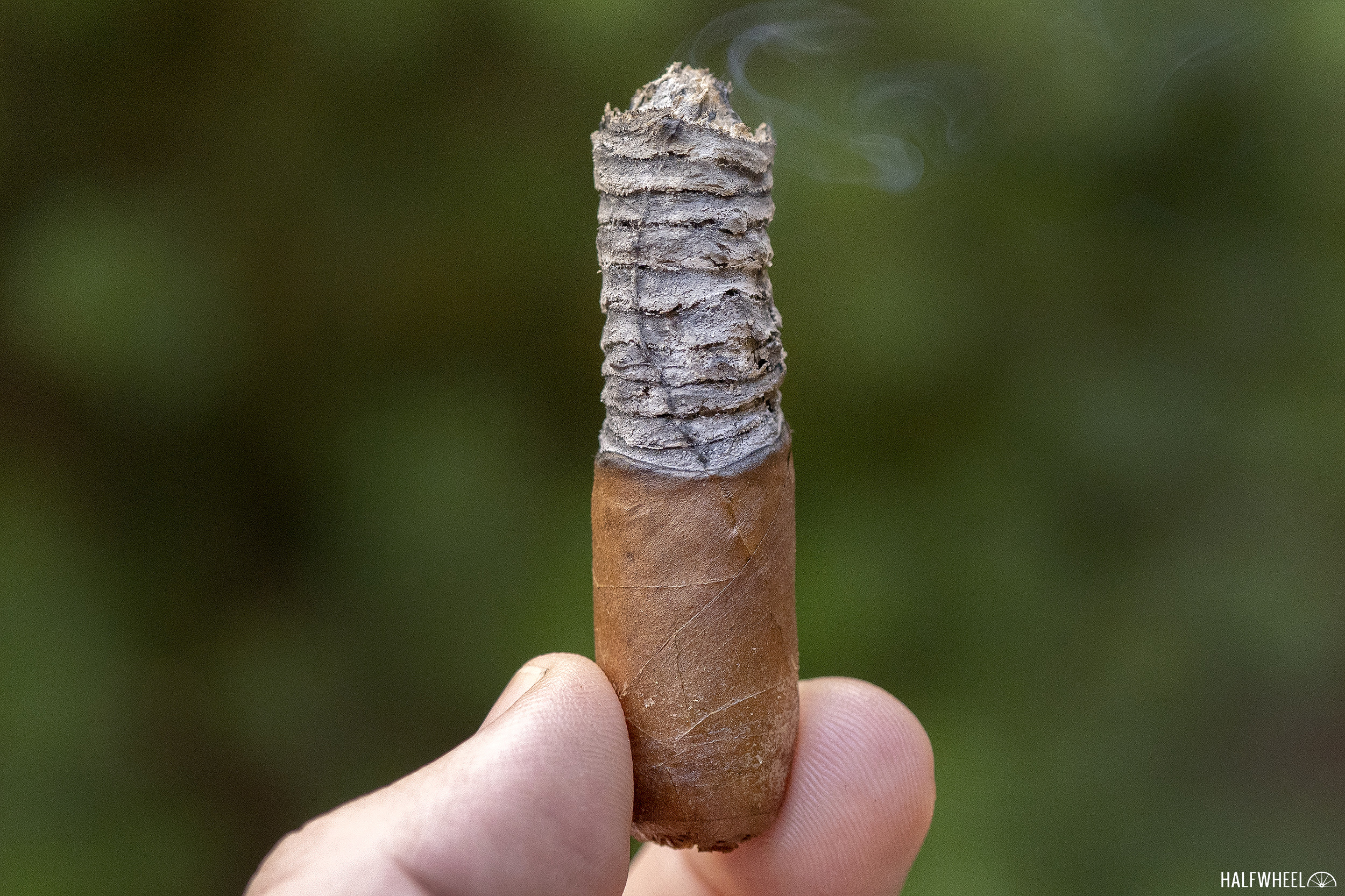
Final Notes
- The early ash on the first sample was really interesting, a solid light gray clump but that seemed like it was trying to take a left turn at one point but ended up straightening out. I should have photographed it, but it dropped just after I noticed the interesting shape. The second sample wasn’t as pronounced, but it definitely had a curve to it.
- Poehler said that he finds lonsdale is more body and pepper, the toro is sweeter and creamier, where as the robusto falls in between those.
- This is one of those big flavor, little strength cigars, which I really enjoy. It goes to show that it can be done with the right combination of tobacco.
- The cigars for this review were purchased by halfwheel.
- Final smoking time was 55 minutes on average.
- Site sponsors Atlantic Cigar Co. and Cigar Hustler carry the Aladino Cameroon Lonsdale.
To borrow from some of my other reviews, say the word Cameroon and you’ve got my attention. In this case, it’s even more attention than normal since it’s not a traditional Cameroon, but rather one grown in Honduras, which opens up a new option much like that of Connecticut seed tobacco that had been grown in the U.S. before being grown in Ecuador. In the case of the Aladino Cameroon Lonsdale, the end result is a cigar that shows its own take on the red pepper and spice that is synonymous with what the leaf is known for while falling a bit short in sweetness, instead, delivering unmistakable Honduran flavors. This is a cigar that is absolutely worth trying, and one I would encourage any fan of Cameroon to smoke a few of and then put it head-to-head with your favorite Cameroon-wrapped cigars. If nothing less, it gives fans of the varietal a very enjoyable option to diversify their experiences this distinct leaf.
